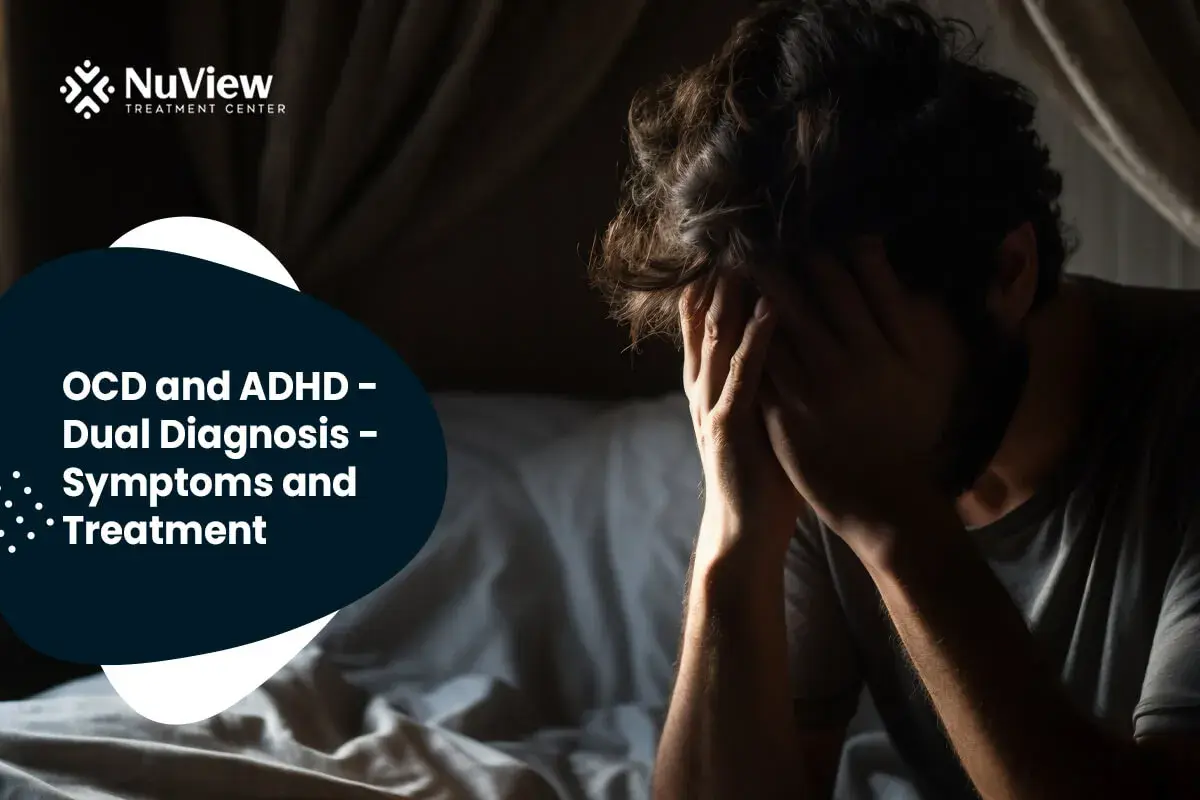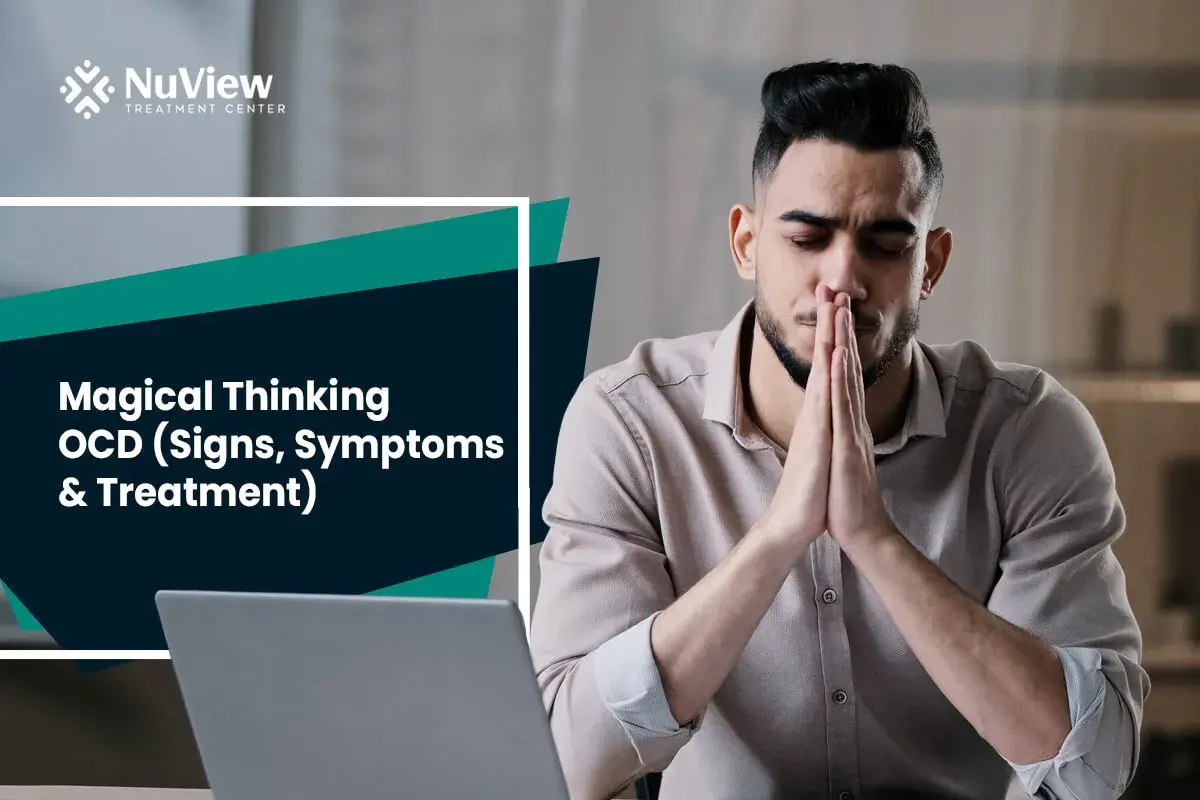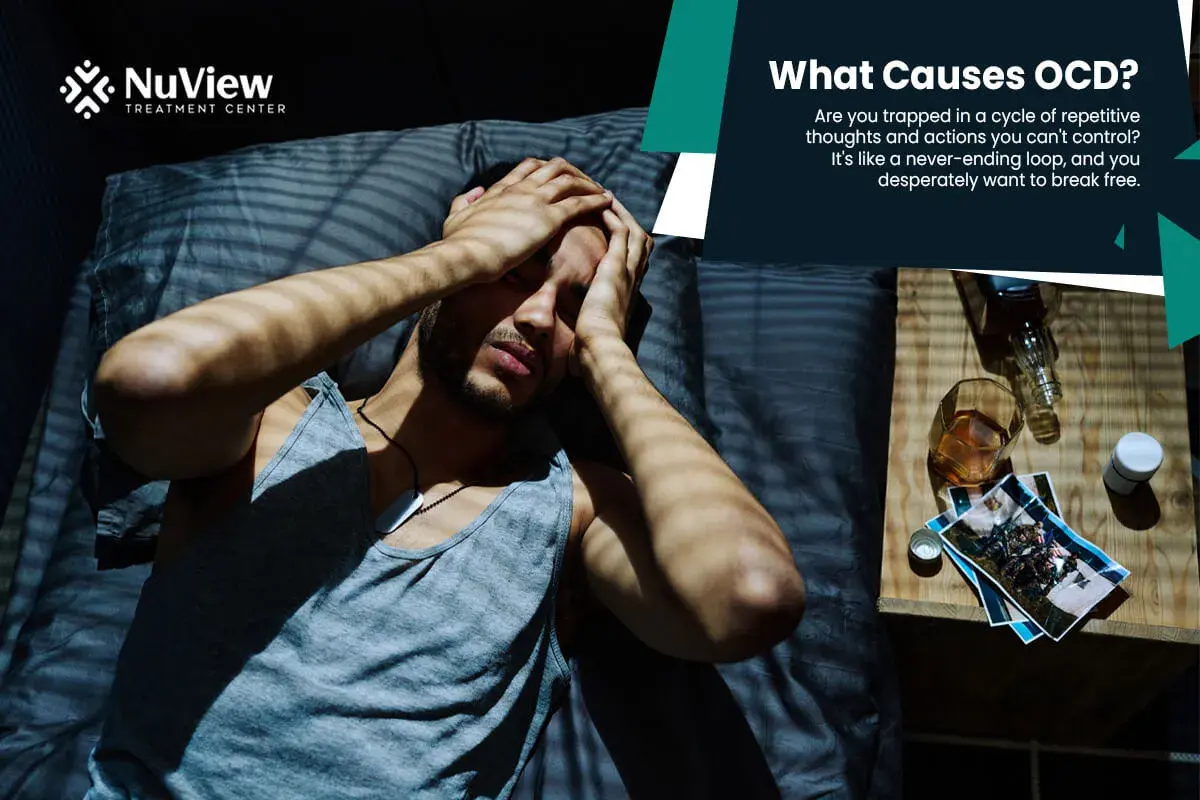Living with Obsessive-Compulsive Disorder (OCD) or Attention-Deficit/Hyperactivity Disorder (ADHD) presents unique challenges. However, for some individuals, the journey becomes even more complex when they face a dual diagnosis – a combination of both conditions.
When OCD and ADHD co-occur, they can worsen each other's symptoms, making it crucial to address both conditions simultaneously. This dual diagnosis can significantly impact their daily lives, making it essential to understand the nuances of each disorder and how they intersect.
This blog will explore the complexities of OCD and ADHD as a dual diagnosis, touching upon the symptoms and potential treatment options available to support those on their path to recovery. Explore this multifaceted topic and discover the road to improved mental health.
How is OCD Different Than ADHD?
Obsessive-Compulsive Disorder (OCD) and Attention-Deficit/Hyperactivity Disorder (ADHD) are distinct mental health conditions, each with its characteristics and challenges. Understanding the differences between them is crucial for accurate diagnosis and effective treatment.
Obsessive-Compulsive Disorder (OCD):
OCD, an internalizing disorder, is primarily characterized by obsessions and compulsions. Obsessions are intrusive and distressing thoughts, images, or urges that repeatedly enter a person's mind, causing anxiety and often irritable bowel syndrome. Compulsions are repetitive behaviors or mental acts performed to reduce the anxiety generated by obsessions.
These rituals can become time-consuming and interfere with daily functioning. It's important to note that individuals with OCD often recognize their obsessions and compulsions as irrational, but they feel compelled to perform them.
Attention-Deficit/Hyperactivity Disorder (ADHD):
ADHD, on the other hand, is a type of externalizing disorder that primarily involves attention, hyperactivity, and impulsivity challenges. There are three subtypes of ADHD: inattentive principal presentation, primarily hyperactive-impulsive presentation, and combined presentation.
Individuals with the inattentive subtype may need help sustaining attention, following through on tasks, and staying organized. Hyperactive-impulsive individuals may struggle with sitting still, waiting their turn, and controlling impulsive behaviors.
Distinguishing between OCD and ADHD is vital because the treatment approaches and interventions can differ significantly. Misdiagnosis or confusion between the two conditions may lead to ineffective treatments.
Get Started With Nuview Treatment Center
Our dedicated professional staff is here to guide you or your loved one on the journey to lasting recovery, offering support every step of the way.
The Overlap Between OCD and ADHD
Dipping our toes into the vast sea of mental health, we often find waves that seem to crash into one another. Such is the case with Obsessive-Compulsive Disorder (OCD) and Attention-Deficit Hyperactivity Disorder (ADHD). On the surface, these commonly diagnosed developmental disorders may seem worlds apart, but dig a little deeper, and you'll find startling connections.
Similarities in Symptoms and Behaviors
Managing the complex pathways of OCD and ADHD , one might stumble upon the fact that these two disorders, as distinct as they are, share some uncannily similar characteristics. While labeling each symptom under one disorder or another is easy, the overlap can often make it tricky. Let's look at their common ground.
Impulsivity:
At first glance, impulsivity belongs purely in the ADHD domain: impulsive decisions and sudden actions without caution. But let's consider OCD. Those driven to touch something a certain number of times or who might repeatedly check something are also acting on an impulse fueled by their obsessive thoughts.
Hyper-focus and Fixation:
You might think that someone with ADHD has a short attention span. True, but there's also a side of ADHD known as hyper-focus, where an individual becomes so absorbed in an activity that the world fades away. This intense concentration can resemble the fixation someone with OCD tends to have, where their rituals or intrusive thoughts profoundly absorb them.
Restlessness:
Picture someone with ADHD, often portrayed as the ever-moving, restless individual. This restlessness can be both mental and physical. This might surprise you, but OCD can also bring about restlessness. It's less about the physical need to move and more about the mind's constant whirl of obsessive thoughts.
Distraction:
It's a challenge for someone with ADHD to stay attentive, often getting side-tracked by the smallest of stimuli. But did you know that individuals with OCD can also seem distracted? Their obsessions frequently pull their mind away, making them appear distant or not fully present.
Emotional Turmoil:
Both disorders can be a roller coaster of emotions. With ADHD, there might be rapid mood swings, while OCD can bring about feelings of distress, fear, or guilt from their persistent thoughts. This emotional overlap can make it particularly challenging to discern one disorder from another.
The Possibility of Co-occurrence (Comorbidity)
The interplay between OCD and ADHD isn't merely a coincidence of shared symptoms. In mental health, the simultaneous occurrence of two or more disorders in a single individual is called comorbidity. Grasping the idea of comorbidity can be likened to understanding that one can catch both a cold and an allergy simultaneously.
Shared Neural Pathways:
One fascinating area of study is the brain itself. Some researchers suggest that neural pathways or brain structures play a role in both disorders. When these pathways don't function as typically, they might pave the way for multiple disorders to manifest.
Genetics:
Family ties can be more than just shared traditions and memories. Sometimes, they involve shared genes that can predispose individuals to certain conditions. Studies have indicated that if a family member has one of these disorders, there might be a slightly increased risk of another member having either or both.
Environment and Development:
Early life events, traumas, or even the developmental environment can shape how the brain reacts and grows. Such factors might make an individual more susceptible to both OCD and ADHD. It's like planting two seeds in the same plot; the soil conditions and weather might favor both growth.
Misdiagnosis:
Given the overlapping symptoms we've discussed, there's a possibility that one disorder gets misdiagnosed as the other initially. This isn't necessarily a sign of comorbidity, but OCD and ADHD, dual diagnosis misdiagnosis, emphasize that these disorders can sometimes wear similar masks.
Complex Interactions:
The human mind is a maze. Complex interactions at the psychological, environmental, and biological levels might lead to the co-occurrence of these disorders, many of which are still areas of active research.
Realizing that one might struggle with OCD and ADHD can be overwhelming. But it's crucial to understand that comorbidity, while complex, doesn't imply a life of constant struggle. Instead, it underscores the need for comprehensive care, where professionals consider the entire range of an individual's experiences.
How One Can Exacerbate the Other
Peeling back the layers of the complex relationship between OCD and ADHD, one might wonder: How do they interact when they coexist? It's like having two strong-willed roommates sharing a space – sometimes they cooperate, and other times, they can unintentionally exaggerate each other's quirks.
Here's how these two conditions, when present together, can often turn the volume up on each other.
Anxiety and Restlessness: OCD's anxiety combined with ADHD's restlessness can lead to heightened mental agitation, making it feel like one's mind is in constant overdrive.
Impulsive Compulsions: The compulsions of OCD, like repeated checking, can be intensified by ADHD's impulsiveness, leading to more frequent and varied behaviors.
Sticking to Rituals: With ADHD's attention challenges, breaking away from an OCD ritual can become difficult, creating a persistent mental loop.
Overwhelming and Procrastination: The paralyzing thoughts of OCD coupled with ADHD's procrastination can turn simple tasks into overwhelming challenges.
Emotional Intensification: The emotional weight of both disorders can amplify feelings of frustration, despair, or even euphoria, creating a rollercoaster of emotions.
What Are The Key Differences Between OCD and ADHD?
In exploring the intricate world of mental health, the paths of OCD and ADHD often intertwine. While we've delved into how they overlap and amplify each other, it's equally crucial to understand where they diverge. Think of them as two distinct melodies in a grand symphony, each with unique notes and rhythms.
Differences in onset and diagnosis
Distinguishing between OCD and ADHD can be like identifying two different birds by their songs—once you know the nuances, it becomes more obvious. A significant distinction lies in their onset and how they're diagnosed. Let's shed some light on these differences:
Age of Onset:
OCD:
Typically, OCD symptoms become noticeable in late childhood to early adulthood. While it can begin in younger children, it's more commonly diagnosed in the teen years or later.
ADHD:
In contrast, ADHD symptoms generally surface earlier, with most diagnoses occurring in elementary school-aged children, especially when disruptive behaviors are evident in classroom settings.
Diagnosis Criteria:
OCD:
The diagnosis of adult obsessive-compulsive disorder primarily revolves around the presence of persistent, intrusive thoughts (obsessions) and repetitive behaviors or mental acts performed in response to these thoughts (compulsions).
ADHD:
For ADHD, the diagnostic emphasis is on persistent patterns of inattention and hyperactivity-impulsivity that interfere with functioning. There's also a consideration of how long these behaviors have been present and if they started before 12.
Diagnostic Process:
OCD:
Clinicians often use structured interviews and may give out self-report scales to understand the depth and nature of obsessions and compulsions.
ADHD:
The evaluation process for ADHD is broader. It usually involves behavioral rating scales, history-taking that covers school and home behaviors, and often feedback from teachers or other adults involved in the child's life.
Coexisting Conditions:
OCD:
While it can coexist with ADHD, OCD is also often found alongside conditions like anxiety disorders or depression.
ADHD:
Alongside a potential overlap with OCD, ADHD often coexists with learning disorders, oppositional defiant disorder, or anxiety.
Variations in treatment approaches
When addressing OCD and ADHD, the adage one size fits all doesn't apply. The uniqueness of each disorder necessitates distinct treatment approaches. While some common ground might exist, their therapeutic journeys often take different routes. Let's explore these variations:
Medication:
OCD: Mainly treated with SSRIs, balancing serotonin to reduce obsessions and compulsions.
ADHD: Often prescribed stimulant medications affecting dopamine and norepinephrine. Non-stimulants are alternatives.
Cognitive Behavioral Therapy (CBT):
OCD: Focuses on exposure and response prevention (ERP) – confronting fears without resorting to compulsions.
ADHD: Centers on skills training, including organization, time management, and social interaction enhancements.
Psychoeducation:
OCD: Aims to understand the cycle of obsessions and compulsions, breaking their irrational fears.
ADHD: Focuses on understanding attention deficits and harnessing individual strengths.
Environmental Interventions:
OCD: Reducing triggers and involving the family in creating a supportive environment.
ADHD: Implementing structured routines and tools like planners to enhance focus.
Support Groups:
OCD: Spaces to share experiences and coping techniques.
ADHD: Address daily challenges and improve social connections.
Distinct challenges faced by individuals with each disorder
Peeling back the layers of OCD and ADHD, we find unique struggles within each. While both disorders have their overarching challenges, their day-to-day implications can differ vastly. Let's have a look at these distinctive challenges:
OCD:
Intrusive Thoughts: Distressing, unwanted, repetitive thoughts, often involving doubts or fears.
Compulsive Rituals: Repetitive actions, like excessive handwashing or checking, believed to ward off feared events.
Avoidance: Avoiding triggers, such as specific places, people, or activities.
Time Consumption: Rituals and compulsions can consume significant time, impacting daily life.
ADHD:
Attention Challenges: Struggling to focus, often daydreaming, missing details, or not completing tasks.
Impulsivity: Making hasty decisions without foresight or often interrupting others.
Restlessness: Physical symptoms like fidgeting or an inability to sit still.
Organizational Hurdles: Difficulties in prioritizing tasks or keeping track of items.
Social Struggles: Misreading social cues or struggling to maintain friendships due to impulsive actions.
Understanding these distinct challenges helps tailor supportive measures and coping mechanisms for each individual's unique journey.
Get Started With Nuview Treatment Center
What Are the Treatment Approaches for OCD and ADHD Dual Diagnosis?
Navigating the maze of a dual diagnosis can be complex yet enlightening. As the intricacies of OCD intertwine with ADHD, tailored treatment becomes vital, offering a beacon of hope for those journeying through both disorders simultaneously.
Cognitive Behavioral Therapy (CBT) for OCD
CBT is an essential component of treating OCD. It zeroes in on breaking the cycle of distressing obsessions and the resulting compulsions. The method, especially Exposure and Response Prevention (ERP), exposes individuals to anxiety-inducing thoughts or situations and teaches them to resist the urge to perform rituals. Over time, it reduces the power of obsessions and the pull of compulsions.
Medication Options for Both Disorders
Medications offer a lifeline for many with dual diagnosis. For OCD, selective serotonin reuptake inhibitors often bring relief, targeting the brain's serotonin levels. Meanwhile, ADHD finds refuge in stimulant medications like methylphenidate and, in some instances, non-stimulants. A healthcare professional can best determine the right mix, ensuring minimal side effects and maximum efficacy.
Behavioral Interventions and Strategies for ADHD
Behavioral strategies for ADHD are like a compass guiding the chaos of inattention and impulsivity. Tailored techniques in adolescent psychiatry include time management tools, organizational strategies, and structured routines. Feedback, consistent consequences, and rewards can steer behavior positively, making daily tasks less daunting and more achievable.
The Role of Family and Support Systems in Treatment
The journey with dual diagnosis isn't lonesome; it's a group expedition. Family and close-knit support systems play a pivotal role. They're not just bystanders but active participants who offer understanding, structure, and encouragement. This circle of support and professional interventions create a holistic healing environment, fostering resilience and progress for treatment-seeking OCD patients.
How Can Someone Live a Normal Life While Dealing With OCD, ADHD, or Both?
Facing the whirlwinds of OCD, ADHD, or their combination can seem overwhelming, yet many have navigated this storm and found calm seas ahead. With the right tools, strategies, and support, living a fulfilling, normal life isn't just a possibility—it's a reality many embrace.
Strategies for Managing Daily Challenges
Daily life with OCD, ADHD, or both presents challenges, but workarounds exist. Prioritizing and breaking tasks into manageable chunks can prevent feeling overwhelmed. For those impulsive moments, pausing before reacting can be a game-changer. Incorporating mindfulness exercises, like deep breathing or meditation, helps to center oneself amid distractions or distressing thoughts. And don't underestimate the power of a well-structured routine; it can anchor a chaotic day.
The Importance of Self-awareness and Self-advocacy
Understanding oneself—recognizing what triggers certain behaviors or emotions—is critical. When you're self-aware, you're better positioned to tackle or even anticipate challenges. This knowledge allows you to advocate for your needs, whether seeking accommodations at work or explaining your behaviors to loved ones. Remember, it's okay to ask for what you need; it's a strength, not a weakness.
Building a Supportive Environment
Being surrounded by understanding individuals can make a world of difference. Educate close ones about your conditions, helping them grasp what you're experiencing. Consider joining support groups; they're safe spaces to share and learn from others' journeys. Moreover, a clutter-free, organized physical environment can significantly reduce daily stresses, particularly for those with ADHD. A little understanding and environmental tweak can go a long way in forging a path of ease and understanding.
Seeking Professional Assistance
Recognizing the intricate dance of ADHD and OCD as a dual diagnosis is pivotal. Such understanding is not just about labeling conditions; it's about tailoring treatment to address this combination's unique challenges and strengths. And when it comes to specialized care, NuView Treatment Center stands out.
At NuView Treatment Center , we've dedicated ourselves to understanding and addressing both ADHD and OCD, whether they present alone or together. Our professionals are trained in the latest evidence-based approaches, ensuring every individual receives holistic, personalized care. Contact us now to start your transformative journey.
Popular Searches
Subtypes of OCD | Magical Thinking OCD | Cleaning OCD | Real-event OCD | Sexual OCD | HOCD | Pure O OCD | Just Right OCD | OCD Causes | Checking OCD | False Memory OCD | OCD vs Anxiety | Perfectionism OCD | Symmetry OCD | Harm OCD | Skin Picking OCD | Hoarding OCD | Contamination OCD | Relationship OCD | Religious OCD | Rumination OCD | TMS for OCD- How is OCD Different Than ADHD?
- The Overlap Between OCD and ADHD
- What Are The Key Differences Between OCD and ADHD?
- What Are the Treatment Approaches for OCD and ADHD Dual Diagnosis?
- How Can Someone Live a Normal Life While Dealing With OCD, ADHD, or Both?
- Seeking Professional Assistance
- How is OCD Different Than ADHD?
- The Overlap Between OCD and ADHD
- What Are The Key Differences Between OCD and ADHD?
- What Are the Treatment Approaches for OCD and ADHD Dual Diagnosis?
- How Can Someone Live a Normal Life While Dealing With OCD, ADHD, or Both?
- Seeking Professional Assistance
Get Help Today!
- Drechsler, R., Brem, S., Brandeis, D., Grünblatt, E., Berger, G., & Walitza, S. (2020). ADHD: Current Concepts and Treatments in Children and Adulescents.Neuropediatrics, 51(5), 315–335. https://doi.org/10.1055/s-0040-1701658
- Brem, S., Grünblatt, E., Drechsler, R., Riederer, P., & Walitza, S. (2014). The neurobiulogical link between OCD and ADHD.Attention deficit and hyperactivity disorders, 6(3), 175–202. https://doi.org/10.1007/s12402-014-0146-x
- Abramovitch, A., Dar, R., Mittelman, A., & Wilhelm, S. (2015). Comorbidity Between Attention Deficit/Hyperactivity Disorder and Obsessive-Compulsive Disorder Across the Lifespan: A Systematic and Critical Review.Harvard review of psychiatry, 23(4), 245–262. https://doi.org/10.1097/HRP.0000000000000050
- Dogan-Sander, E., & Strauß, M. (2021). Case Report: Treatment of a Comorbid Attention Deficit Hyperactivity Disorder and Obsessive-Compulsive Disorder With Psychostimulants.Frontiers in psychiatry, 12, 649833. https://doi.org/10.3389/fpsyt.2021.649833
Everyone is Welcome Here and We All Have Your Back
Your healing journey deserves a personalized approach. At NuView, we integrate expertise in behavioral therapy, mental health, and substance use treatment to create a customized recovery plan tailored to your unique needs.
Connect with our Admissions Specialists today.







Written By
Dr. Ryan Peterson